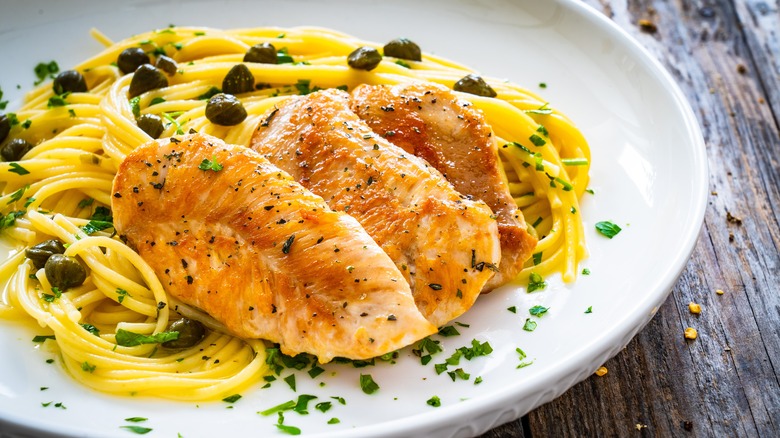The Boozy Substitute For Lemon Juice That May Be In Your Kitchen Already
Whether you use it for remedying a too-spicy soup, livening up a marinade, or adding a burst of freshness to a cold glass of water, lemon juice is a must-have kitchen essential with limitless applications. However, sometimes we find ourselves short on the ingredients we need to round out a dish, even everyday pantry staples like lemons. But if you ever find yourself in need of lemon juice without the goods to produce it, turn to your white wine repertoire.
Like lemon juice, white wine is an acidic ingredient, which is crucial for providing a tangy brightness to dishes and balancing flavors in complex recipes. White wine often has subtle fruity undertones, inviting a layer of tartness akin to the lemon flavor that complements both sweet and savory dishes.
If you're worried about catching a buzz from your white wine-infused dish, don't fret! Because cooking with wine significantly reduces its alcohol content, and you'll only be using a small amount of it as you would with lemon juice, you won't be intoxicated after you enjoy your dish.
White wine varieties
Though it would be easier if it were, white wine isn't a solitary ingredient. In fact, there are over 600 white wine varieties worldwide, so picking which one works best as a lemon juice substitute is no small task. Luckily, we've narrowed down the options to simplify your decision-making.
For starters, opt for dry and crisp white wines that provide acidity without an imposing and cloying sweetness. Sauvignon blanc, pinot grigio, albariño, or unoaked chardonnay are good choices as these varieties bring a refreshing acidity that can easily mimic the tartness of lemon juice. You might also consider white wines specifically crafted with citrus undertones, such as a dry riesling or vermentino. Avoid sweet white wines like moscato and sweet rieslings to prevent introducing a cloying acidity to your dish.
You don't need to break the bank or uncork your finest bottle when substituting lemon juice for white wine. You should be able to find a variety that is palatable and can be enjoyed on its own for under $20.
Culinary applications
Now that you're privy to this unsuspecting yet handy ingredient swap, you'll need some ideas for putting it to use. Introduce a sophisticated twist to a chicken piccata dish by substituting white wine for lemon juice in the sauce. Accented by subtle, fruity notes, the white wine adds a refreshing complexity to the dish while simultaneously complementing the recipe's briny capers. Instead of marinating your fish in a lemon-based brine, white wine brings a touch of sophistication that dances gracefully with other garden fresh herbs, peppery spices, and depth-enhancing seasonings commonly included in a fish marinade. If neither of those options speaks to you, use white wine in other lemon-centric recipes like creamy pasta, cold-curing soups, or a hearty bounty of roasted vegetables.
Don't forget dessert! Replace lemon juice in shortbread cookies with white wine to balance the buttery richness of the cookies with a bright and fruity tartness. Reimagine classic lemon bars by incorporating white wine into the lemon curd layer for a bite teeming with floral notes and a familiar zestiness. Don't hesitate to use white wine in other dessert recipes like sorbet, muffins, and sweet bread.
Next time you're short on lemon juice, spare yourself the drive to the store and use your white wine instead. Just make sure it's the same quality that you'd want to drink on its own.


